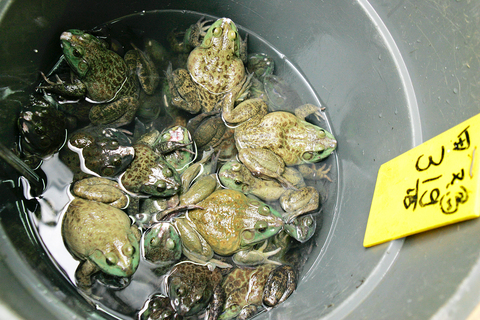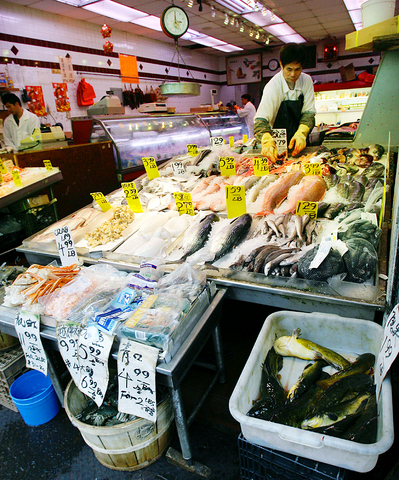When a food safety inspector walked into a market in the borough of Queens, he noticed the store had an interesting special posted on its front window: 12 beefy armadillos.
In Brooklyn, inspectors found 6.7kg of iguana meat at a West Indian market and 90kg of cow lungs for sale at another market.
At a West African grocery in Manhattan, the store was selling smoked rodent meat from a refrigerated display case.

PHOTO: AP
All was headed for the dinner table. All was illegal. Such food can spread nasty bacteria like salmonella or botulism.
Authorities say the discoveries are part of a larger trend in which markets across New York are buying meat and other foods from unregulated sources and selling them to an immigrant population accustomed to more exotic fare.
State regulators have increased enforcement measures, confiscating 65 percent more food through September than they did in all of last year.

PHOTO: AP
The seizures also focus on the eating habits of this ethnically diverse city, where everything from turtles and fish paste to frogs and duck feet make their way onto people's plates.
"At one time or another, we've probably seen about everything," said Joseph Corby, director of the state's Division of Food Safety and Inspection.
In an attempt to stop the activity, Corby's agency has increased efforts, working with the Food and Drug Administration, to prevent the illicit food from reaching store shelves.
Corby said his inspectors are also targeting warehouses that receive imported products -- Russian, Asian and African -- from where the food is distributed.
So far, it appears the campaign has been effective. In the first nine months of the year, inspectors across the state seized 720,000kg of food, destroying about 81 percent. Last year, the state seized 439,234kg.
Food taken by Corby's inspectors lacked proper labeling or did not come from a government licensed or inspected source.
Other food was destroyed because of the way it was processed or prepared, like chicken smoked in the home and placed on sale.
"Immigrants coming from the Third World would not be schooled in the issues of cross contamination and would not intuitively know hygiene standards," said Dr. Pascal James Imperato, a former city health commissioner who spent six years in Africa with the US Centers for Disease Control and Prevention.
"They don't know how simple contamination can result in a widespread epidemic," he added.
The law varies from animal to animal.
Bush meat, or anything killed in the wild, is typically illegal, Corby said. Eating endangered or threatened species like as gorilla and chimpanzee -- whose meat is occasionally found in New York -- is against the law.
But turtles, frogs, iguana and armadillos can be eaten under one condition: The meat must come from a licensed and inspected facility.
"We have yet to find too many of these places," Corby said.
State sanitary inspection reports dating back to 2001 reveal a widespread appetite for potentially dangerous food.
In Manhattan's Chinatown, Bor Kee Food Market has been caught selling unidentified red meat. Down the street at Dahing Seafood Market, inspectors have found frogs being sold from an unapproved source.
"That's a no-no because there is absolutely no monitoring of the standards in these places," said Dr. Philip Tierno, author of The Secret Life of Germs: Observations and Lessons from a Microbe Hunter, and director of clinical microbiology at New York University Medical Center.
"It's subject to the vagaries of whoever is processing the food. Who's watching?" he said.
In a city filled with people from all over the world, the law can get lost in translation.
At the West African Grocery -- where "smoked rodent" was found -- the owner failed to explain why he was selling the mysterious meat, saying he could not speak English.
At another market in Brooklyn called Chang Xiang Trading, the manager shrugged her shoulders when confronted with reports showing the store has sold illegal pork, chicken and ducks. Her English was not good, she said.
Sung Soo-kim, president of Korean American Small Business Service Center of New York, says it is hard to change centuries-old eating habits.
Kim runs a state-approved food safety education program and has delivered seminars to the Korean community about food laws.
Corby says that one way to get businesses to comply with the program is ordering them to take a state-approved food inspection course.
If all else fails, Corby will get a court injunction and close stores, something the state did 66 times last year and 72 times through September this year.
"We either clean them up or close them down," he said. "There is a high standard that is applied. We'd rather have it too high than too low."

‘ABUSE OF POWER’: Lee Chun-yi allegedly used a Control Yuan vehicle to transport his dog to a pet grooming salon and take his wife to restaurants, media reports said Control Yuan Secretary-General Lee Chun-yi (李俊俋) resigned on Sunday night, admitting that he had misused a government vehicle, as reported by the media. Control Yuan Vice President Lee Hung-chun (李鴻鈞) yesterday apologized to the public over the issue. The watchdog body would follow up on similar accusations made by the Chinese Nationalist Party (KMT) and would investigate the alleged misuse of government vehicles by three other Control Yuan members: Su Li-chiung (蘇麗瓊), Lin Yu-jung (林郁容) and Wang Jung-chang (王榮璋), Lee Hung-chun said. Lee Chun-yi in a statement apologized for using a Control Yuan vehicle to transport his dog to a

INDO-PACIFIC REGION: Royal Navy ships exercise the right of freedom of navigation, including in the Taiwan Strait and South China Sea, the UK’s Tony Radakin told a summit Freedom of navigation in the Indo-Pacific region is as important as it is in the English Channel, British Chief of the Defence Staff Admiral Tony Radakin said at a summit in Singapore on Saturday. The remark came as the British Royal Navy’s flagship aircraft carrier, the HMS Prince of Wales, is on an eight-month deployment to the Indo-Pacific region as head of an international carrier strike group. “Upholding the UN Convention on the Law of the Sea, and with it, the principles of the freedom of navigation, in this part of the world matters to us just as it matters in the

BEIJING’S ‘PAWN’: ‘We, as Chinese, should never forget our roots, history, culture,’ Want Want Holdings general manager Tsai Wang-ting said at a summit in China The Mainland Affairs Council (MAC) yesterday condemned Want Want China Times Media Group (旺旺中時媒體集團) for making comments at the Cross-Strait Chinese Culture Summit that it said have damaged Taiwan’s sovereignty, adding that it would investigate if the group had colluded with China in the matter and contravened cross-strait regulations. The council issued a statement after Want Want Holdings (旺旺集團有限公司) general manager Tsai Wang-ting (蔡旺庭), the third son of the group’s founder, Tsai Eng-meng (蔡衍明), said at the summit last week that the group originated in “Chinese Taiwan,” and has developed and prospered in “the motherland.” “We, as Chinese, should never

The High Court yesterday found a New Taipei City woman guilty of charges related to helping Beijing secure surrender agreements from military service members. Lee Huei-hsin (李慧馨) was sentenced to six years and eight months in prison for breaching the National Security Act (國家安全法), making illegal compacts with government employees and bribery, the court said. The verdict is final. Lee, the manager of a temple in the city’s Lujhou District (蘆洲), was accused of arranging for eight service members to make surrender pledges to the Chinese People’s Liberation Army in exchange for money, the court said. The pledges, which required them to provide identification